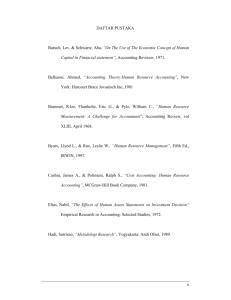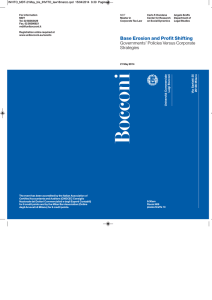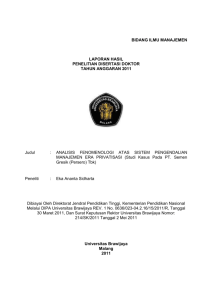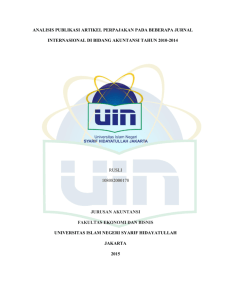SILABUS Seminar Doktoral Perpajakan Program
advertisement
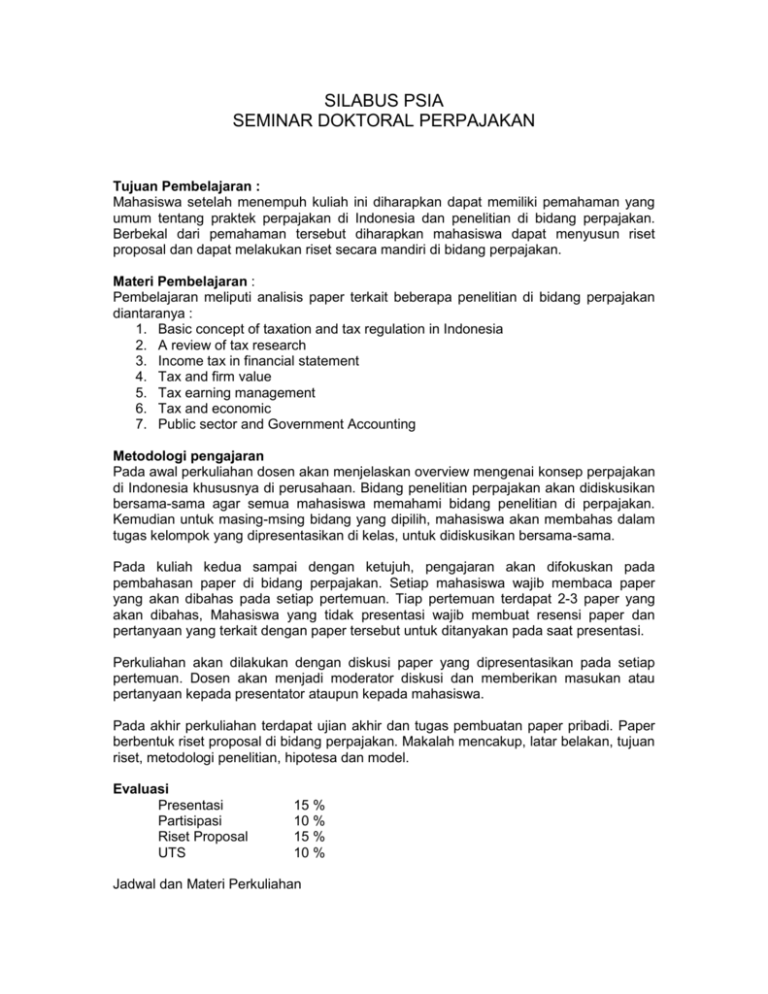
SILABUS PSIA SEMINAR DOKTORAL PERPAJAKAN Tujuan Pembelajaran : Mahasiswa setelah menempuh kuliah ini diharapkan dapat memiliki pemahaman yang umum tentang praktek perpajakan di Indonesia dan penelitian di bidang perpajakan. Berbekal dari pemahaman tersebut diharapkan mahasiswa dapat menyusun riset proposal dan dapat melakukan riset secara mandiri di bidang perpajakan. Materi Pembelajaran : Pembelajaran meliputi analisis paper terkait beberapa penelitian di bidang perpajakan diantaranya : 1. Basic concept of taxation and tax regulation in Indonesia 2. A review of tax research 3. Income tax in financial statement 4. Tax and firm value 5. Tax earning management 6. Tax and economic 7. Public sector and Government Accounting Metodologi pengajaran Pada awal perkuliahan dosen akan menjelaskan overview mengenai konsep perpajakan di Indonesia khususnya di perusahaan. Bidang penelitian perpajakan akan didiskusikan bersama-sama agar semua mahasiswa memahami bidang penelitian di perpajakan. Kemudian untuk masing-msing bidang yang dipilih, mahasiswa akan membahas dalam tugas kelompok yang dipresentasikan di kelas, untuk didiskusikan bersama-sama. Pada kuliah kedua sampai dengan ketujuh, pengajaran akan difokuskan pada pembahasan paper di bidang perpajakan. Setiap mahasiswa wajib membaca paper yang akan dibahas pada setiap pertemuan. Tiap pertemuan terdapat 2-3 paper yang akan dibahas, Mahasiswa yang tidak presentasi wajib membuat resensi paper dan pertanyaan yang terkait dengan paper tersebut untuk ditanyakan pada saat presentasi. Perkuliahan akan dilakukan dengan diskusi paper yang dipresentasikan pada setiap pertemuan. Dosen akan menjadi moderator diskusi dan memberikan masukan atau pertanyaan kepada presentator ataupun kepada mahasiswa. Pada akhir perkuliahan terdapat ujian akhir dan tugas pembuatan paper pribadi. Paper berbentuk riset proposal di bidang perpajakan. Makalah mencakup, latar belakan, tujuan riset, metodologi penelitian, hipotesa dan model. Evaluasi Presentasi Partisipasi Riset Proposal UTS 15 % 10 % 15 % 10 % Jadwal dan Materi Perkuliahan Pertemuan Materi 1 Overview perpajakan di Indonesia dan Akuntansi Pajak Penghasilan Referensi Konsep Perpajakan umum Pajak di Indonesia (pajak penghasilan, pajak pertambahan nilai dan pajak daerah) Pajak dalam perekonomian Penelitian perpajakan di Indonesia The Future of tax Reserach: From an Accounting Proffessor’s Perspective, Terry Shevlin, the Journal of the American Taxation Association, Fall 2007; 87 Empirical tax research in accounting Douglas, “A.Shackelford, Terry Shevlin, Journal of Accounting and Economics (2001) 321-387. 2 Review bidang riset perpajakan A review of Tax Research, Michelle Hanlon and Shane Heitzman, Journal of Accounting and Economics (2010) (50) 127-178. 3 Tax and financial statement 4 Tax avoidance Research in accounting for income taxes, John R.Graham, Jana S.Raedy , Douglas A.Shackelford Journal of Accounting and Economics (2011) Nov. Taxable Income as a Performance Measure:The Effects of Tax Planning and Earnings Quality, Benjamin C. Ayers, John Xuefeng Jiang and Stacie K Laplante, Contemporary Accounting Research, Vo 26, No 1 (Spring 2009) pp. 15-54 Perceived versus Actual Cash Flow Implications of Deferred Taxes—An Analysis Of Value Relevance and Reversal under IFRS, Astrid K. Chludek, Journal of International Accounting Research, Vo 10. No 1, 2011 p 1-25. Conservatism and Book-Tax Differences, Wendy Heltzer, Journal of Accounting, Auditing and Finance, pp 470-504. Taxes, Leverage, and the Cost of Equity Capital, Dan Dhaliwal, Shane Heitzman, Oliver Zhen Li, Journal of Accounting Research, Vol. 44 No. 4 Corporate Tax Avoidance and Firm Value, Mihir A. Desai and Dhammika Dharmapala, The Review of Economics and Statistics, August 2009, 91(3): 537–546 5 Tax and Earning management 6 International tax, behavior and economic impact 7 Public Sector Government Accounting Tax Reporting Aggressiveness and Its Relation to Aggressive Financial Reporting, Mary Margaret Frank, Luann J. Lynch, Sonja Olhoft Rego, The Accounting Review, 2009, Vol 84 No 2 pp.467-496 Long-Run Corporate Tax Avoidance, Scott D. Dyreng, Michelle Hanlon, Edward L. Maydew, The Accounting Review, Vol. 83, No. 1 2008 pp. 61–82 Corporate social responsibility and tax aggressiveness: An empirical analysis, Roman Lanisa, Grant Richardsonb, J. Account. Public Policy 2011. Creating a Bigger Bath Using the Deferred Tax Valuation Allowance, Theodore E. Christensen, Gyung H. Paik and Earl K. Stice,Journal of Business Finance & Accounting, 35(5) & (6), 601–625, June/July 2008. Can book–tax differences capture earnings management and tax Management? Empirical evidence from China, Tanya Tang, Michael Firth, The International Journal of Accounting 46 (2011) 175–204 An Examination of Corporate Tax Shelter Participants Ryan J. Wilson, The Accounting Review, 2009, Vol 83 No 2 pp.669-699. An uninteded consequence of book-tax conformity: A loss of earnings informativeness, Michelle Hanlon, Edward L. Maydew, Terry Shevlin, Journal of Accounting and Economics 46 (2008) 294-311. The Effects of Executives on Corporate Tax Avoidance, Scott D. Dyreng, Michelle Hanlon,Edward L. Maydew, Accounting Review, Vol. 85, 2010 pp. 1163–1189 A Note on the Relation between Frames, Perceptions, and Taxpayer Behavior, Scot B. Jackson and Richard C. Hatfield, Contemporary Accounting Research Vol. 22 No. 1 (Spring 2005) pp. 145-64 Corporate taxes and the location of intangible assets within multinational firms, Matthias Dischinger a, Nadine Riedel, Journal of Public Economics, 95 (2011) 691–707 What does tax aggressiveness signal? Evidence from stock price reactions to news about tax shelter involvement, Michelle Hanlon, Joel Slemrod, Journal of Public Economics 93 (2009) 126-141. Public sector and Government accounting Budget Adjustments in Response to Spending Variances: Evidence of Ratcheting of Local Government Expenditures, Tanya M. Lee and Robert Morris, Journal of Management Accounting Research, Volume Nineteen, 2007, pp. 137–167 Govenance Structure and Accounting at large municipalities, Giroux Gary and Andrew J. Mc.Lelland, Journal of Accounting and Public Policy, 2003, Volume 8, Issue, 3, Autumn, pages 199-217. Accrual Accounting in EU Local Governments: One Method, several Approaches, Vincente Pina, Lourdes Torres and Ana Yetano, European Accounting Review, Vol. 18, No. 4, 765–807, 2009 The quality and conservatism of the accounting earnings of local governments, Matt Pinnuck, Bradley N. Potter, J. Account. Public Policy 28 (2009) 525-540
